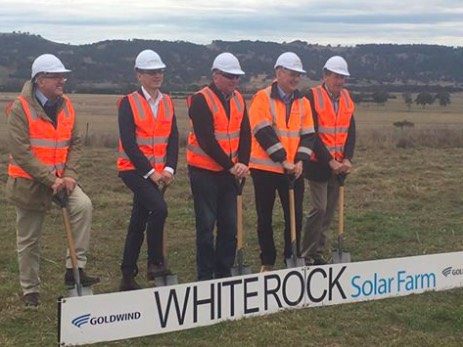
Deputy prime minister Barnaby Joyce delivered a warning to the renewable energy industry in Australia on Wednesday, declaring that if there was a South Australia-style “black event” in Sydney, it could be the end of the industry.
In a highly anticipated address to the Clean Energy Summit (it was standing room only) Joyce said if the lights went out in Sydney, and people could not use their air conditioning, it would be disastrous.
“It doesn’t mater which political party you are in, you wouldn’t be able to survive…. you have to keep the lights on and air con on in biggest city of Australia,” he said.
Joyce did not make clear how it would be that a state such as NSW, with relatively small amount of renewable energy in its system, might find a way to blame renewables for any blackout that occurred.
Indeed, the NSW Coalition energy minister Don Harwin earlier in the day had praised the performance of renewables for actually keeping the lights on in Sydney earlier this year, something he has done on many other occasions.
NSW did nearly lose power, when two big coal units and two big gas generators failed at the peak of a heat-wave, but was only saved because wind and solar performed as predicted, producing at record amounts, and the Tomago aluminium smelter was fired to reduce power.
Altogether, more than 2GW of fossil fuel capacity went missing that day, and fossil fuel generators in other states also failed in the heatwave that swept Australia in February.
It was not the only time Joyce’s comments put him at odds with others in the Coalition, and in a sign that the Coalition is struggling to get its talking point together, it seems that they cannot even agree if all electrons are equal or not.
“We believe that all electrons are created equal,” he said. “We are not involved in some religious perspetive of some electrons being more rightous than others.”
We think we know what he means, but his comments jar with those of energy minister Josh Frydenberg who said precisely the opposite last week, when he claimed that not all electrons are equal, because electrons from wind and solar are not dispatchable like electrons from coal, gas and hydro.
Joyce’s appearance generated much interest – a point he conceded when he declared at the start of his speech that his turning up at the summit “may seem innocuous” – (we’re pretty sure he meant to say “incongruous”) – given his stance on renewable energy and his support for coal.
He said that the Coalition anticipated more wind, solar, pumped hydro and efficient coal fired power, underlining the Conservative support for coal fired power stations, a notion mocked by Harwin earlier in the day.
But Joyce, whose electorate has become a major renewable energy hub thanks to new projects such as the White Rock wind and solar farms, and the Sapphire wind project, did conceded one thing: New England will be a power exporter, predominantly from renewables.”
And at least there some progress on another point: Joyce suggested nuclear as an option “if you really want clean energy” but then conceded: “One inhibiting factor is cost, I believe.” Yep.







